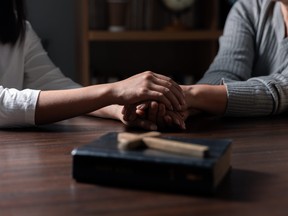
Reviews and recommendations are unbiased and products are independently selected. Postmedia may earn an affiliate commission from purchases made through links on this page.
Article content
My female friends and I are all infatuated with the same guy.
Advertisement 2
Article content
They call him Hot Rabbi.
I’m talking about Adam Brody’s character on the hit Netflix series, No One Wants This. The rom-com follows Joanne – a 30-something agnostic sex podcaster played by Kristen Bell – and Noah, a newly single Rabbi played by Brody – as they meet, fall in love and navigate their wildly different yet meddling families. Brody and Bell’s onscreen chemistry is electric and we can’t get enough.
In addition to plenty of swoon-worthy moments, the show highlights the peaks and valleys of navigating an interfaith relationship. In the series, Joanne is faced with scrutiny and a lack of acceptance from her partner’s family, friends, and Jewish community. According to experts, Joanne’s experience isn’t entirely uncommon, but it also doesn’t provide the complete picture.
Article content
Advertisement 3
Article content
When you enter into an interfaith relationship like the one depicted on the show, you’re not just blending two different personalities – something that’s challenging on its own – but also two different belief systems, says Tina Fey, a relationship expert at Hack Spirit.
This can create additional friction in the relationship – especially when cultural and religious differences clash with core values and long-held traditions.
These conflicts can’t be brushed under the rug. “These differences often manifest in decisions around holidays, raising children, and even lifestyle choices. For example, in Nobody Wants This, Joanne’s agnostic stance directly contrasts with Noah’s life as a rabbi,” says Joseph Cavins, LMFT, a Clinical Director at Southern California Sunrise Recovery Center.
Advertisement 4
Article content
Your success as an interfaith couple largely hinges on how you handle these challenges together. As Cavins points out, “Couples may find that these differences either enrich their relationship, offering new perspectives or become a source of ongoing conflict, particularly if there’s a lack of open communication.” In the case of Joanne and Noah, their interfaith dynamic forces them to have uncomfortable, yet necessary conversations around their belief systems.
Like any other relationship, establishing open, honest communication is important in an interfaith partnership. “Don’t assume things will fall into place on their own,” says Fey. Instead, she encourages couples to talk about the big stuff early on. “It’s important to make sure you’re both clear on your expectations,” says Fey.
Advertisement 5
Article content
If things get serious and you’re ready to make a legally binding commitment to each other, you also need to discuss the uncomfortable reality of what would happen if the relationship ends. Cynthia Hernandez is the Managing Attorney for Hernandez Family Law and Mediation, who’s seen firsthand how cultural and religious differences in interfaith relationships can affect legal decisions, especially in cases of divorce and child custody.
“I’ve handled divorce cases where unresolved conflicts from cultural differences became contentious points in legal proceedings,” she says. However, creating mutual rituals and regularly discussing values can preempt these disputes and create a balanced partnership based on mutual respect.
Advertisement 6
Article content
It’s also important to remember that family expectations can also heavily shape interfaith relationships – especially if one or more partners are from a religious background that prioritizes family and community over individualism. While not every couple is going to face the same level of pushback as Joanne and Noah, “When families get involved, their expectations can add pressure (sometimes without even realizing it),” says Fey.
If families are resistant to your relationship, it’s important to stand united as a couple. Fey says, “Be open to educating family members about each other’s cultures or beliefs, but don’t be afraid because your relationship should be the priority, not trying to meet everyone else’s expectations.”
Advertisement 7
Article content
Additionally, interfaith couples need to keep in mind that compromise is essential. “It’s not about giving up one’s faith or culture but rather finding a way to blend them that honours both partners,” says Cavins. Instead of focusing on differences, Cavins suggests couples look for shared values and, “explore how these can be honoured in ways that feel authentic to both partners.”
Lastly, keep in mind that what you see on screen – the intense familial strife and rejection in No One Wants This – is not the reality for everyone. Fey wishes the media would focus less on the struggles of interfaith couples and instead highlight the growth that happens by overcoming these obstacles together.
While love may not conquer all, Fey says, “The good news is, couples who treat each
other’s beliefs with curiosity and respect can turn those differences into a source of strength.”
Article content
